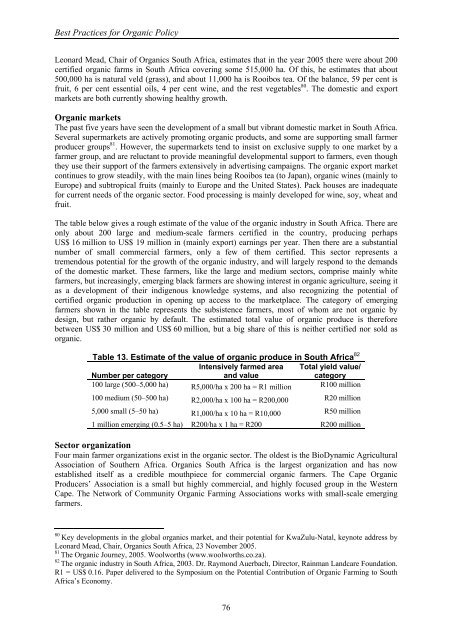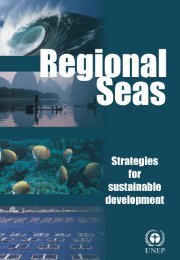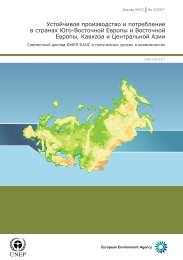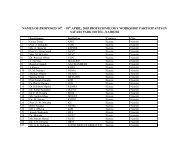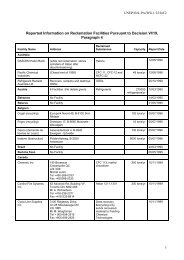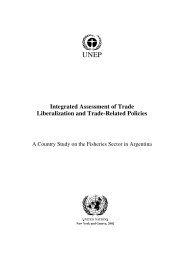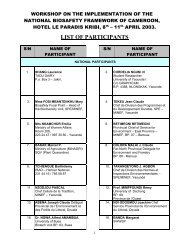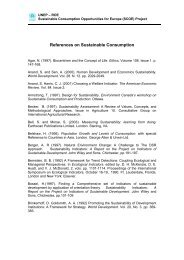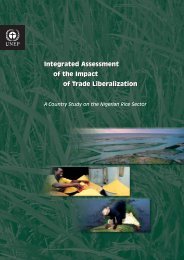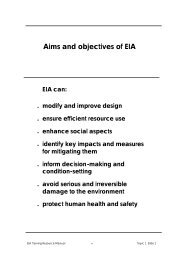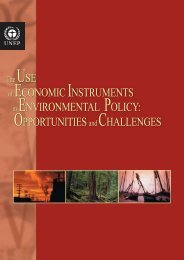Best Practices for Organic Policy - What developing country - UNEP
Best Practices for Organic Policy - What developing country - UNEP
Best Practices for Organic Policy - What developing country - UNEP
Create successful ePaper yourself
Turn your PDF publications into a flip-book with our unique Google optimized e-Paper software.
<strong>Best</strong> <strong>Practices</strong> <strong>for</strong> <strong>Organic</strong> <strong>Policy</strong><br />
Leonard Mead, Chair of <strong>Organic</strong>s South Africa, estimates that in the year 2005 there were about 200<br />
certified organic farms in South Africa covering some 515,000 ha. Of this, he estimates that about<br />
500,000 ha is natural veld (grass), and about 11,000 ha is Rooibos tea. Of the balance, 59 per cent is<br />
fruit, 6 per cent essential oils, 4 per cent wine, and the rest vegetables 80 . The domestic and export<br />
markets are both currently showing healthy growth.<br />
<strong>Organic</strong> markets<br />
The past five years have seen the development of a small but vibrant domestic market in South Africa.<br />
Several supermarkets are actively promoting organic products, and some are supporting small farmer<br />
producer groups 81 . However, the supermarkets tend to insist on exclusive supply to one market by a<br />
farmer group, and are reluctant to provide meaningful developmental support to farmers, even though<br />
they use their support of the farmers extensively in advertising campaigns. The organic export market<br />
continues to grow steadily, with the main lines being Rooibos tea (to Japan), organic wines (mainly to<br />
Europe) and subtropical fruits (mainly to Europe and the United States). Pack houses are inadequate<br />
<strong>for</strong> current needs of the organic sector. Food processing is mainly developed <strong>for</strong> wine, soy, wheat and<br />
fruit.<br />
The table below gives a rough estimate of the value of the organic industry in South Africa. There are<br />
only about 200 large and medium-scale farmers certified in the <strong>country</strong>, producing perhaps<br />
US$ 16 million to US$ 19 million in (mainly export) earnings per year. Then there are a substantial<br />
number of small commercial farmers, only a few of them certified. This sector represents a<br />
tremendous potential <strong>for</strong> the growth of the organic industry, and will largely respond to the demands<br />
of the domestic market. These farmers, like the large and medium sectors, comprise mainly white<br />
farmers, but increasingly, emerging black farmers are showing interest in organic agriculture, seeing it<br />
as a development of their indigenous knowledge systems, and also recognizing the potential of<br />
certified organic production in opening up access to the marketplace. The category of emerging<br />
farmers shown in the table represents the subsistence farmers, most of whom are not organic by<br />
design, but rather organic by default. The estimated total value of organic produce is there<strong>for</strong>e<br />
between US$ 30 million and US$ 60 million, but a big share of this is neither certified nor sold as<br />
organic.<br />
Table 13. Estimate of the value of organic produce in South Africa 82<br />
Number per category<br />
Intensively farmed area<br />
and value<br />
Total yield value/<br />
category<br />
100 large (500–5,000 ha) R5,000/ha x 200 ha = R1 million R100 million<br />
100 medium (50–500 ha) R2,000/ha x 100 ha = R200,000 R20 million<br />
5,000 small (5–50 ha) R1,000/ha x 10 ha = R10,000 R50 million<br />
1 million emerging (0.5–5 ha) R200/ha x 1 ha = R200 R200 million<br />
Sector organization<br />
Four main farmer organizations exist in the organic sector. The oldest is the BioDynamic Agricultural<br />
Association of Southern Africa. <strong>Organic</strong>s South Africa is the largest organization and has now<br />
established itself as a credible mouthpiece <strong>for</strong> commercial organic farmers. The Cape <strong>Organic</strong><br />
Producers’ Association is a small but highly commercial, and highly focused group in the Western<br />
Cape. The Network of Community <strong>Organic</strong> Farming Associations works with small-scale emerging<br />
farmers.<br />
80<br />
Key developments in the global organics market, and their potential <strong>for</strong> KwaZulu-Natal, keynote address by<br />
Leonard Mead, Chair, <strong>Organic</strong>s South Africa, 23 November 2005.<br />
81<br />
The <strong>Organic</strong> Journey, 2005. Woolworths (www.woolworths.co.za).<br />
82<br />
The organic industry in South Africa, 2003. Dr. Raymond Auerbach, Director, Rainman Landcare Foundation.<br />
R1 = US$ 0.16. Paper delivered to the Symposium on the Potential Contribution of <strong>Organic</strong> Farming to South<br />
Africa’s Economy.<br />
76


